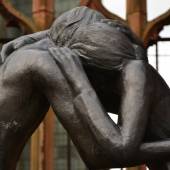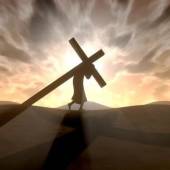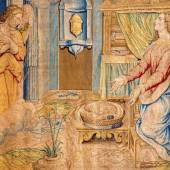“He went around all of Galilee proclaiming the Kingdom of God” (Matthew 4,12-23)

The Word of God Sunday, Third Sunday of Ordinary Time, 22 January 2023
“He went around all of Galilee …”
A. Text: Matthew 4,12-23
When he heard that John had been arrested, he withdrew to Galilee. He left Nazareth and went to live in Capernaum by the sea, in the region of Zebulun and Naphtali, that what had been said through Isaiah the prophet might be fulfilled: "Land of Zebulun and land of Naphtali, the way to the sea, beyond the Jordan, Galilee of the Gentiles, the people who sit in darkness have seen a great light, on those dwelling in a land overshadowed by death light has arisen."
From that time on, Jesus began to preach and say, "Repent, for the kingdom of heaven is at hand." As he was walking by the Sea of Galilee, he saw two brothers, Simon who is called Peter, and his brother Andrew, casting a net into the sea; they were fishermen. He said to them, "Come after me, and I will make you fishers of men." At once they left their nets and followed him.
He walked along from there and saw two other brothers, James, the son of Zebedee, and his brother John. They were in a boat, with their father Zebedee, mending their nets. He called them, and immediately they left their boat and their father and followed him. He went around all of Galilee, teaching in their synagogues, proclaiming the gospel of the kingdom, and curing every disease and illness among the people.
B. Exegesis:
1. This Sunday of the Word of God (instituted by Pope Francis) we see Jesus the Galilean back in his Galilee. Having been baptized in the Jordan and tempted in the wilderness, He has now returned to Galilee.
What is Jesus doing in Galilee? He is preaching, teaching, healing and exorcizing. He walks by the Sea of Galilee and calls some fishermen. He walks all over Galilee. He steps into synagogues. Having left the settled life in Nazareth, he is now an itinerant in Galilee.
2. Deuteronomy 18,15.18 predicted a prophet like Moses: “A prophet like me will the LORD, your God, raise up for you from among your own kinsmen; to him you shall listen.”
Now this prophecy is fulfilled in Jesus, the Great Galilean Preacher. People come to this New Moses; they listen to Him; and they follow Him. His fame precedes Him.
3. What does Jesus say? This itinerant Galilean proclaims, “Repent, for the kingdom of heaven is at hand.”
Jesus wishes that people turn from rebellion to obedience. He wishes that they obey God and their lives be governed by Him. He wishes that they ‘re-turn’ (i.e. the Hebrew notion of ‘teshuvah’) from their life of sin and rebellion to a particular ‘way of life’ (i.e. the concept of ‘kingdom’), designed by God. He proclaims this.
4. What does Jesus do other than proclaiming the imminence of the Kingdom? He heals.
The days of Jesus – the first century AD – is marked with the presence of Jewish exorcists as evident in Matthew 12,27 (“And if I drive out demons by Beelzebul, by whom do your own people drive them out?”) and Antiquities of the Jews (8,2.5 # 42-49) by a Jewish historian, Flavius Josephus. Some miracle workers are in the business to make money from those who are gullible. They also used long and complicated rituals of exorcism.
But Jesus does not profit from the power to heal. He is never a magician or money-seeking wonder worker. He utters a simple command, sometimes accompanied by a touch.
What does, then, Jesus mean by His healings and exorcisms? Jesus the Galilean Folk Healer lets people experience the bliss of the Kingdom life through them. He sees them as palpable signs of liberation and hope. They destroy the evil power that causes sickness, death and natural disasters and make people experience the saving power of God in their lives. He restores the sick to their proper status, role and place in the society and Judaism. He restores the socio-religious networks, ruptured by sickness. Those healed could return to their ordinary life. They are healed integrally – physically, psychically (as mentally agonized by physical ailment and socio-religious taboos), socially (as socially ostracized) and religiously (as barred from public worship). He reinstates them into their psycho-somatic and socio-religious life. The Kingdom dawns!
5. This great Fisher of people is, thus, walking all over Galilee and catching people for the Kingdom. He walks in front. He now wishes that some would walk behind Him. He intends to train and qualify them to be fishers of people after Him. Hence the calling by the Lake, “Come after me, and I will make you fishers of men.”
Just as people follow Him, these four fishermen, namely Peter, Andrew, James and John, begin to walk behind Jesus and become His disciples.
C. Application:
6. This story of Jesus never ended. It did not get drowned in the Sea of Galilee. It but continued in the life and mission of St. Joseph Vaz. Having heard the calling of the Lord, he became a fisher of people in his native Goa, his Nazareth. That was in 1676. Then he heard Him calling again. This time, it was to be a fisher of people across the Sea. To be a fisher of folk in the Dutch Ceylon, the Galilee of the Gentiles (non-Indians)!
Our forefathers sat in darkness and they were overshadowed by death in those times of the Dutch persecution, just like the Land of the tribes of Zebulun and Naphtali was invaded, devastated and inhabited by the Gentile Assyrians. The original Christianity, planted in the Portuguese period, was being ferociously persecuted; a distorted Christianity was being forcibly sowed. Then arose upon our Land, in those volatile and turbulent times in 1687, the great light of Christ through the missionary labours of Joseph Vaz.
On the model of Jesus, Fr. Vaz walked far and wide in our Land. In the broad day light, masquerading like a beggar or sanyasi or bread seller or fishmonger, and in the moonlight like a clandestine priest, he brought the light of Christ to our forefathers. He brought the Kingdom life near to them. Catholics, who had been converted to Calvinism, returned to Catholic faith. Some became even martyrs, like Dom Pedro of Jaffna.
Fr. Vaz healed the hearts, wounded by the brutality of the Dutch and restored the faith, tarnished and tormented by the error of Calvinism. During the small fox epidemic in Kandy, he took the risk of contagion and served the sick when everyone else left the city. God, the Lord of nature, opened the sky for rain, when Fr. Vaz interceded in time of severe drought.
Fr. Vaz called the laity by the sea in the Maritime Provinces to be fishers of folk. He gave them a missionary impetus. He, then, called some of his fellow Oratorians to extend his mission in this Galilee of the Gentiles. They too left their Nazareth and came to this Land by the Sea. Thus the great light of Christ was rekindled in the hearts of our people.
7. This sunny Sunday of the Word of God, instituted by Pope Francis, let us renew our faith walking with St Joseph Vaz, the gift of God to us. As we pray during this special time of grace which commences today. (“A day devoted to the Bible should not be seen as a yearly event but rather a year-long event …”, Pope Francis, Aperuit illis, Apostolic Letter, # 8), we must, with the Spirit of God that guided the destinies of Jesus and Fr. Vaz, strive “to bring the straying faithful back to the fold” and become “an evangelizing Church in Sri Lanka.”
Today this Pearl of the Indian Ocean is beset with hundreds of Christianities – to the surprise and scandal of Buddhists and Hindus. The so-called Free Churches mushroom in and around the original habitats of our Catholics misinterpreting the Sacred Scriptures, preserved and handed down by the original Church with meticulous care. Not a few have been converted to them; not a few have been fascinated by their highly subjective biblical eisigesis.
The biblical exegetes try to draw out the meaning of the biblical text objectively in accordance with the sitz-im-leben (setting-in-life), whereas the poor biblical eisegetes try to read into the Text imposing their own presuppositions subjectively. Hence the dire need of faith renewal today through the celebration of the Word of God Sunday – beyond the Third Sunday in Ordinary Time – throughout the year!
Radio Veritas Asia (RVA), a media platform of the Catholic Church, aims to share Christ. RVA started in 1969 as a continental Catholic radio station to serve Asian countries in their respective local language, thus earning the tag “the Voice of Asian Christianity.” Responding to the emerging context, RVA embraced media platforms to connect with the global Asian audience via its 21 language websites and various social media platforms.














